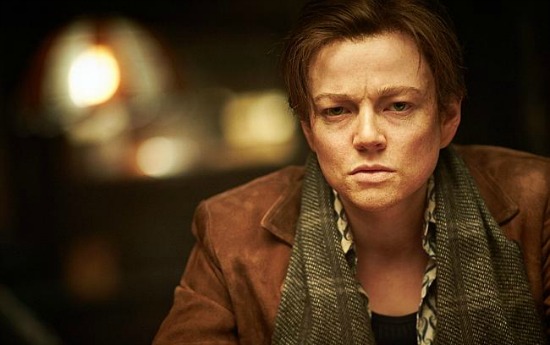It’s hard not to feel disappointment at much of what passes for recent cinematic science fiction. Whilst there are some films which get a fair percentage of things right, but contain substantial failings elsewhere (Snowpiercer or Transcendence, for example), there are also disasters so vast as to be of almost cosmic proportions (Elysium or Jupiter Ascending) and very few masterpieces, with the possible exception of Under the Skin. Which is all the more reason for this adaptation of Robert Heinlein’s 1959 short story ‘All You Zombies’ by the German born, Australian directors the Spierig Brothers – whose previous film was the flawed but interesting Daybreakers, which also featured Ethan Hawke, in a future where vampires had become the ruling elite – to come as a most welcome surprise.
Superior to Looper, but perhaps not in the same league as Twelve Monkeys, Predestination distinguishes itself by taking a paradox all the way to its (il)logical conclusion, whilst simultaneously offering an intense and moving performance from Sarah Snook, as well as solid turns from Hawke and Noah Taylor. Snook, who just won an AACTA (Australian version of the Academy Awards) for her portrayal of the duel-gendered protagonist Jane/John, reportedly overturned the directors’ original intention to cast male and female actors to play the role when she successfully auditioned for both parts. Looking like a downtrodden young Leonardo DiCaprio when s/he first walks into the bar where Hawke’s character is stationed, yet beautiful and wide-eyed as the teenage girl in the story s/he narrates, Snook provides an essentially believable human anchor to a story that packs a real mind-warping metaphysical punch.
The film’s structure, in which the narrative is set out as a bar room tale inspired by a wager, is enormously inviting and despite setting out its premise fairly early on, the film never really gives up messing with the viewer’s mind. You’re likely to think, ‘okay, I saw that coming’ at some stage or another, but when the extent to which the idea of the paradox is pursued becomes more apparent, it still comes as a shock.
Despite the convoluted nature of the events that transpire, the film is slick and unfussy in the science-fiction details it deploys. The time-travel apparatus, a ‘Coordinate Transformer Field Kit,’ is disguised simply as a violin case with the lock providing the digits for temporal settings. No doubt this springs from the low budget, but it nevertheless feels right, perhaps because the twists and turns of the plot offer plenty of distraction in themselves.
Hawke portrays a temporal agent – with Taylor’s shadowy boss manipulating events behind the scenes – hunting the oddly monikered ‘Fizzle Bomber.’ Beginning with an uncharacteristically violent scene in which Hawke’s agent’s face is damaged in an explosion, whilst another as yet unknown character escapes elsewhere into time, the Spierig’s focus is more weighted towards character development and exposition than most other films of this genre. It remains gripping, nevertheless, for the entirety of its 97 minutes and invites an almost compulsory second viewing, just to make sense of its nonlinear form.
Getting the balance right between the dictates of fate implied by the title, whilst still managing to convey the chronology of events as a series of character inspired choices, is a difficult trick, but the Spierig’s manage it with aplomb. The film remains relatively faithful to Heinlein’s short story, with aspects reflecting the sexist attitudes of the time in which it was written, such as the ‘Space Angels’ corps that Jane enlists in still seeming a little jarring. But these are portrayed through the lens of Snook’s highly individual character and thus appear all the more obviously objectionable, as indeed they should.
This is a smart, stylish and thought provoking entry in the genre, which doesn’t shy away from depicting the darkness and chaos implied in its central conceit. It also represents a considerable development in the directors’ prowess, which may yet at some future point render them capable of creating the kind of magnum opus that science fiction cinema so desperately needs.




